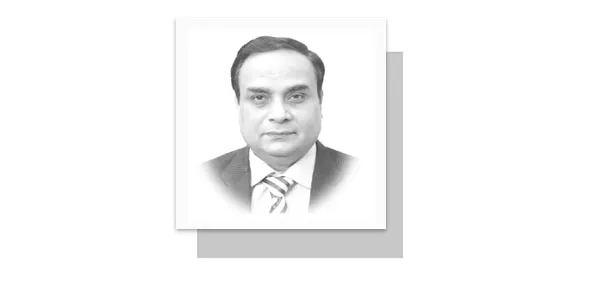THE current rapidly changing geopolitical and geostrategic scenarios in the world clearly demonstrate a drastic change in the global power chessboard searching new readjustments, realignments, re-alliances and re-unions pushing towards the redrafting, remapping and redesigning of new proxies around the world. It seems that every power broker has its own queen desiring to conquer the world through a new end game pulling the axis and angles of gravity towards its centre. First, the Ukrainian President Volodymyr Zelenskyy’s current statement of receding vividly reflects changing geopolitical and geostrategic preferences of Washington DC and Brussel after January 20, the start of the President Donald Trump era. Thus US stealth diplomacy has been activated conveying new whims and wishes of the new king to the world. It is indeed a strategic backlash for the NATO eastern expansion encircling Russia and its allies in the Black Sea.
Zelenskyy reiterated his new subdued stance in a series of interviews with the western media that produced new ripples in numerous capitals around the globe. Zelenskyy stated that the Russia-Ukraine war needs to end and Kyiv was willing to give up territory to Russia in order to reach a ceasefire agreement with Moscow. According to a report by UK-based daily, The Telegraph, Zelenskyy stated that Kyiv is willing to work out a ceasefire deal with Moscow and ready to cede the occupied territory to Russia, albeit with some conditions.
It is indeed a major compromise by Zelenskyy over territory for sure, but it also reflects the harsh reality. Before this, Zelenskyy had stressed that a peace deal would not go through unless Russia’s annexation of Ukrainian territories was nullified. However, handling over these territories under the umbrella of NATO may still be a main hurdle for achieving the peace between Russia-Ukraine conflict. Second, the trans-regional dominance and destruction wave is also disturbing peace, stability and harmony in Georgia and pro-European and pro-Russian are colluding spreading black clouds over the country. So the backyard of Russia is in flames showing the dawn of a new complex and complicated power chessboard in the world competing for ultimate supremacy, superiority and super gains through smoking guns of geopolitics.
Protesters rallied outside Georgia’s Parliament for a seventh consecutive night, venting their anger at the government’s decision to suspend EU membership talks. Earlier, police conducted a crackdown, searching the offices and homes of prominent activists and opposition leaders, detaining seven. Thousands of pro-EU protesters took to the streets after police raids on opposition party offices and arrests following the prime minister’s threat to punish opponents. Turmoil has rocked Tbilisi since the ruling Georgian Dream party claimed victory in the October 26 parliamentary election, denounced by opposition groups as rigged. Tens of thousands have protested the alleged fraud. Prime Minister Irakli Kobakhidze’s announcement that Georgia would not hold EU talks until 2028 sparked fresh uproar and more rallies.
Third, the South Korean episode rattled the US and its regional allies and produced a serious dent in their ongoing anti-China massive campaign in the Asia Pacific especially in the South China Sea. The ongoing game of snake and ladder put the Korean stability and sustainability at stake. President Yoon Suk Yeol declared martial law, creating the most serious challenge to South Korea’s democracy since the 1980s as lawmakers rejected the move in a vote and protesters gathered outside parliament. Yoon’s declaration, which he cast as aimed at his political foes, was vocally opposed by the speaker of parliament and even the leader of Yoon’s own party, Han Dong-hoon, who has clashed with the president over his handling of recent scandals.
Live television footage showed helmeted troops apparently tasked with imposing martial law attempting to enter the National Assembly building. Parliamentary aides were seen trying to push the soldiers back by spraying fire extinguishers. Yoon said in a TV broadcast that opposition parties had taken the parliamentary process hostage. He vowed to eradicate “shameless pro-North Korean anti-state forces” and said he had no choice but to take the measure to safeguard constitutional order. Third, redeployment of troops in far flank islands by Japanese forces, installation of the US ballistic missiles in Philippine along with various new military bases, holding of joint drills and exercises in South China Sea with Australia, South Korea, Philippine and many other regional countries and last but not the least arms supplies to Taiwan all vividly reflecting emergence of new power politics polluting the waters for encircling China.
The Asia Pacific has emerged as a new flashpoint, with Chinese wisdom through peaceful dialogue, diplomacy and development delaying a full-fledged war in the region, including the South China Sea. Meanwhile, the Syrian civil war, once overshadowed by global crises like COVID, Ukraine and Gaza, has resurfaced with the opposition’s capture of Aleppo. This development re-engages regional players like Russia, Turkiye and Iran, amid allegations of Western-sponsored conspiracies fuelling uncertainty and chaos. Yet, China’s constructive neutrality and balanced engagement offer a path toward resolving conflicts and advancing global peace and progress.
In summary, it seems that the emerging world power chessboard is eclipsing the economic stability and geopolitical sustainability creating new blocs and the World War mentality is crusading humanity and global harmony. The Chinese President Xi Jinping’s most recent participation in the APEC and G20 and delivering a new road map for economic globalization and international cooperation is the way forward. Xi’s valuable proposals for cooperation are holding an ideal recipe for a peaceful world. The US President Elect Trump’s threats and tariffs are forcing many ASEAN countries to revisit their policies towards China and recent imposition of dumping duties on Malaysia, Thailand, Cambodia and Vietnam all vividly reflecting outburst of genie of geopolitics in the world.
—The writer is President, Pak-China Corridor of Knowledge, Executive Director, CSAIS, regional expert: China, CPEC & BRI.









